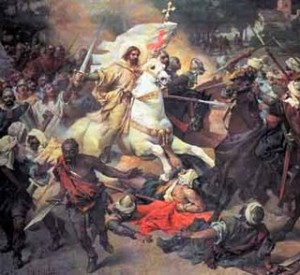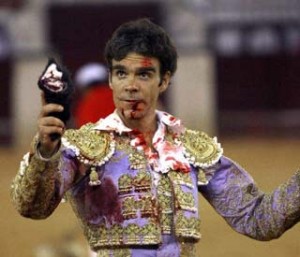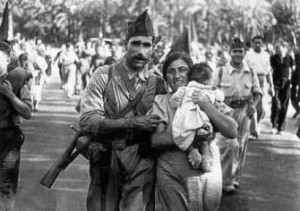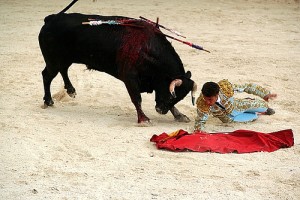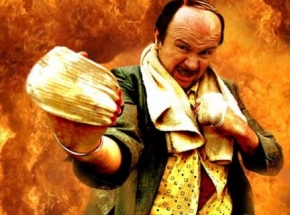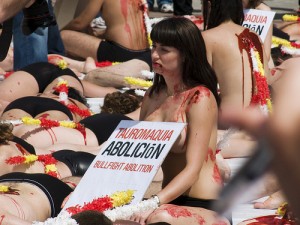When Spanish troops arrived in Iraq in 2004 to help the allied occupation of the country, they looked much like any other force of Western troops, wearing uniform and wielding guns. But a closer look showed them wearing something that spoke very clearly of their Spanish identity and history: the red cross of Santiago Matamoros, or Saint James the Moorslayer. It was a crass gesture, given the Muslim enemy they were going to fight, but Spain and particularly its military have used St James as a symbol of inspiration in different guises for the last 1,200 years. July 25 is the feast day of Spain’s patron saint, when he and the extravagant legend surrounding his afterlife are … [Read more...] about Celebrating Santiago’s ever-changing afterlife
Culture
Revisiting Laurie Lee’s Spain
The vista below me spread from Ronda to the Rif, a classical arrangement of sea and rock, with the mouth of the Mediterranean pierced by the wash of ships tracing a course as old as Homer. Kites and kestrels swung silently overhead, smouldering in the evening sun; and twilight approached, the pillars of Hercules turned purple and the sea poured between them in a flush of lavender. Alone, with my back to a sun-warmed rock, I finished the last of my food, gazing where Africa and Europe touched fingertips in this merging of day and night. It is over three-quarters of a century since a young Laurie Lee disembarked at the Galician city of Vigo, having crossed the Bay of Biscay, with a violin … [Read more...] about Revisiting Laurie Lee’s Spain
A literary trip through Toledo’s historical labyrinth
Even before I moved to Spain, and particularly before I started reading about Spain, I was fascinated by the clash between the idea of Catholic Spain and the other peoples, cultures and faiths who've lived here. The more I travelled around the country, and the more books I read, these others – particularly Moors and Jews – emerged as not just temporary alien visitors, but an enduring presence through the centuries. A plan formed, slowly, to visit Toledo, bringing these books along as guides, to see how this story of Spain might be written into the buildings of one of the country's most famously Catholic cities, a place described by Jan Morris as the “repository of all that is proudest, … [Read more...] about A literary trip through Toledo’s historical labyrinth
The king of the ring returns, but can he save bullfighting?
For some, he epitomizes the courage and dignity of the great matadors. For others, he is an artless brute, whose thirst for blood helps keep an absurd tradition alive. José Tomás divides opinion with the same drama with which he kills bulls. His skill and apparently reckless willingness to put his own life on the line make him the most talked-about torero in the world. Tomás has been away from bullfighting for over a year. He was severely gored in the leg at Aguascalientes, Mexico, in April of last year and as he was carried to the infirmary, leaving a trail of blood in his wake, many feared for his life. After a forced layoff, Tomás will return to the ring this summer, to the delight of … [Read more...] about The king of the ring returns, but can he save bullfighting?
The Spanish holocaust
Even to this day, when asked about the slaughter and repression carried about by General Francisco Franco during the Spanish Civil War and in the years that followed, the standard reply from many Spaniards is that atrocities were committed on both sides. But in this relentlessly harrowing read, British historian Paul Preston provides, page after page, factual, documentary accounts of the systematic policy introduced by Franco early on in the war to rid the country of the red menace and to install a reign of terror among the few that might still contemplate resistance. This was accomplished through disappearances, and in many cases, the murders of entire families, along with theft of young … [Read more...] about The Spanish holocaust
Sábato, Argentina’s contradictory literary giant
Ernesto Sábato, who died on April 30 at the age of 99, was, as Voltaire said of all great men and women, a mass of contradictions. And therein lies the strength of the Argentine’s writing: he always wrote what he understood to be true, according to his often contradictory experiences. He was chosen to head the committee (CONADEP) tasked with investigating the "disappearances" of thousands of people during Argentina’s dictatorship, yet had initially supported the military when it took over in 1976 at a time of mounting economic problems, social turmoil, and clashes with leftist guerrillas who carried out kidnappings and killings. He had joined other writers in a meeting with dictator … [Read more...] about Sábato, Argentina’s contradictory literary giant
Promise of death in the afternoon keeps bullfighting alive for fans
The bull struck its horn deep into his thigh. Seconds later, the same horn speared his neck. Before thousands of anxious eyes and terrified faces, Luis de Pauloba was rushed out of the bullring and into the infirmary. From there, an ambulance hurried him more than 150 kilometres from Cuenca to Madrid. Even after Pauloba had received four litres of blood transfusions, the doctors weren’t optimistic. “They told me that I was going to die because it had almost touched my brain,” Pauloba says. “It was a very unpleasant wound.” Remarkably, in less than five months, Pauloba was back in the ring. “I always had the mentality that after that wound I was going to bullfight. Physically, of … [Read more...] about Promise of death in the afternoon keeps bullfighting alive for fans
Bullfighting: Fighting for its future
Bullfighting has been banned in Spain's northeastern region of Catalonia, but travel south and you find that the tradition and support for bullfighting grows. Seville is no exception. And those involved in bullfighting, an event that finds its origins in the 18th century, recognize the battle they face. Nonetheless, they remain confident that the tradition will continue to thrive in the country’s thousands of bullrings. "In Andalusia, no. Short term, medium term and long term, no,” says bullfighting journalist Álvaro R. del Moral regarding the possible prohibition of bullfights in Southern Spain. “Here things are very clear.” If Del Moral’s prediction is to prove accurate, interest … [Read more...] about Bullfighting: Fighting for its future
Torrente, saviour of the Spanish film industry
Lethal Crisis (Crisis letal) is Santiago Segura’s fourth Torrente movie; the actor-director says it will be his last: the character is “killing” him, although it’s not clear whether the Spanish comic is referring to the 40 kilos he puts on for the role, or his chances of ever winning an Oscar. Torrente 4 trots out the same smutty jokes and seul entendres as its successors, but is made all the more, well, smutty, for being in 3D (That said, this reviewer was surprised, not to say disappointed, that Segura didn’t use the costly Avatar technology at his disposal to shove the abundant breasts and genitalia liberally on display throughout in the audience’s face). It’s hardly worth … [Read more...] about Torrente, saviour of the Spanish film industry
Bullfighting in the political ring
Rich in tradition and explicit in diversity, Spain is a country constantly suffering an identity crisis. Liberalism and democracy were born along with nationalism and separatism after Francisco Franco’s death in 1975. While Spain’s official language is Spanish, a handful of regional languages are spoken across the country. In the northeastern region of Catalonia, people speak Catalan. Citizens from the southern region of Andalusia speak Spanish. A citizen from Seville might not be able to read Avui (a Barcelona-based newspaper printed in Catalan), but when the Catalan government passed a law last summer to close the only remaining bullring in Barcelona in 2012, the bullfighting … [Read more...] about Bullfighting in the political ring
